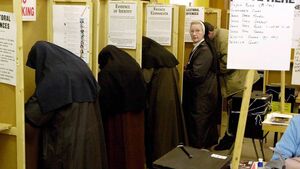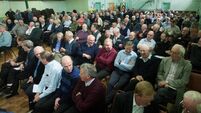Let's hear it for the female election hopefuls

Nuns from the Carmelite Order in Dublin cast their votes during the general election in 2002. Picture: Joe Dunne/Getty Images
I defer to no man or woman or binary or non-binary person(s) in my admiration for the female of the species. I just have a natural inclination to respect, admire, appreciate and worship the species. For reasons best known to myself and someone very near and dear to me, I fall short of idolising the ladies or fantasising over the female form. The female form is undoubtedly a wonderful piece of construction and, to my mind, a far superior, visually attractive and pleasantly eye-catching version of the human form than the male.
I know this might be anathema to the vast majority of people, but it seems to me that God, in his wisdom, knew what he was doing when he plucked a debilitating rib from Adam’s side and built a most beautiful Eve to be the better half and superior. In the past, I have been known to extol the virtue and benefit of embracing the ladies so it will come as no surprise that I am delighted to note that in these upcoming elections, local and European, there is an all-time record number of women offering themselves as candidates for election.
Here in Mayo we are spoiled for choice. In the European race (does Nina Carberry have an advantage, given her racing experience?) we have three natives of the county any of whom would do justice to the job - Maria Walsh, sitting MEP, Shrule; Senator Lisa Chambers, Castlebar and Saoirse McHugh, Achill who, somewhat heroically, goes before the electorate having failed in a previous attempt. Maith thu, Saoirse! (Failed is probably not the appropriate word. Anyone who goes before the electorate can hardly be regarded as a failure. Perhaps, more correctly, it is the electorate that fails).
The Mayo trio are one-third of the nine female candidates, the others being the aforementioned Nina Carberry, Michelle Gildernew, Charlotte Keenan, Margaret Maguire, Pauline O’Reilly and Michelle Smith. No disrespect to those fine ladies but in my humble and biased opinion, they don’t match up to our home-grown ladies.
While I’m tempted to ignore the males in the contest, it is not something I can do given the requirement of the to show balance in our reporting. So, I parade, in a sense, before you the contestants who must match up to the ladies. They are, in no particular order, and without any identifying badges, John Waters, Hermann Kelly, Daniel Pocock, Niall Blaney, Rory Hearne, Luke ‘Ming’ Flanagan, Chris McManus, Stephen Garland, Barry Cowen, James Reynolds, Peter Casey, Fergal Landy, Ciaran Mullooly, Peadar Tóibín, Gerry Waters, Brian O’Boyle, Justin Barrett and Anthony Cahill.
I think you will agree that without their identifying party political badges they are a pretty nondescript bunch. Some names obviously stand out a little. Being an outgoing MEP, clearly Luke ‘Ming’ Flanagan is recognisable. He has a nice handy selling point “Luke understands the job”. Well, after two terms in Europe, he should.
John Waters, yes, he’s the same John Waters who regaled us with his many moons ago. Where has he disappeared to? And of course, there’s the recognisable Ciarán Mullooly, recently retired from our RTÉ news screens.
When you add the party political tag some become more recognisable while there are others whose party political nametag just creates confusion. The mushrooming of new political parties in recent times would fill one with even more despair. Another reason why it is great to welcome the women.
Sadly, however, the good news for the ladies does not continue into the local elections here in Mayo. There is an increase in the number of women on the ballot papers in the five local electoral areas but compared to the men the percentage is closer to 6% than the 30% in the Euro election.
Only two women, long-time councillor Annie-May Reape, FF (Ballina constituency) and Fine Gael’s Donna Sheridan (Castlebar) are outgoing and seeking re-election. There is one lady standing for election in the three-seat Belmullet constituency, three in the 15-candidate six-seat Ballina constituency, two in the nine-candidate four-seat Westport area, and three women out of the 19 candidates running for seven seats in Castlebar.
In Swinford, there are two females out of nine candidates for the four seats on offer and two out of 13 candidates for the six seats up for grabs in the Claremorris constituency. Two men, long-serving councillors John Cribbin and Seamus Weir have retired but will they be replaced by women? Now there’s the $64,000 question.
In terms of party ambitions, Sinn Fein is leading the way with five female candidates nominated and it will be interesting to see how they fare, with particular interest in the intriguing contest in Belmullet, the home base of TD, Rose Conway Walsh. The outcome here will be closely followed and will be an indicator of how valid the arguments are of a groundswell of support for Sinn Féin. It is possible and perhaps even probable that Sinn Féin could end up with three female councillors alongside the evergreen Jerry Murray and hotly fancied John Sheehan.
Of course, it all boils down to the ladies - the lady voters that is. In past elections, there has not been any indication that women have a predisposition towards candidates of their own sex. Male voters, on the other hand, have displayed a more liberal attitude towards the ladies. It is only correct to observe that female voters did not have the same opportunities to make choices on the basis of sex (as well as other attributes!) quite simply because there were very few female names on the ballot papers. That is not the case in this election. There are plenty of female names, there is choice and there is opportunity to strike a real blow for feminism.
Will it happen? Don’t ask me. The one thing I have learned in my time on this earth is not to try to understand women and most certainly not to suggest how they might think. And God forbid that you might suggest how they should vote.
Fair play to Micheál Martin and the Taoiseach Simon Harris and the people of Ireland (the vast majority of them) for taking the initiative and making the running alongside Norway and Spain in recognising the state of Palestine. It is not a decision that will greatly influence events in Gaza or the Middle East but it will, in time, come to be considered a brave and just decision by a small country with a conscience and a sense of what is morally and ethically correct. The killing in Gaza must stop. The people of Israel must put an end to the carnage. Must put an end to the excuses.
Alan Shatter was a man for whom I had considerable respect and was of the view that he was incorrectly and unfairly dismissed as Minister for Justice, Equality and Defence ten years ago. Seeing him interviewed on RTE's last week evoked a feeling of sadness and loss. While he condemned Netanyahu (everyone does, but he remains Prime Minister of a country that recognises no law but their own), Mr Shatter chose to be a spokesman for Israel rather than his own country. He equates Hamas with the Palestinians and conflates the Israelis with the Jews, so criticism of Israel amounts to anti-semitism. That is simply not so. You can be critical of Israel without being anti-Jew. You can empathise with Palestine without supporting Hamas.
Is fear an tsláinte ná na táinte.





